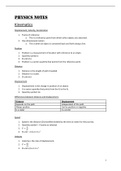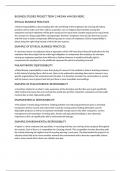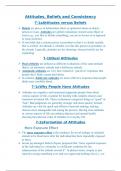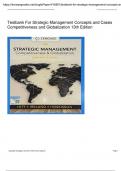Qualitative Research in Organisations
A research project includes the phases of formulating a research objective and research questions,
identifying and making observable the concepts you want to investigate (the data collection plan),
gaining access to an organisation and collecting data, analysing them, answering the central research
question(s) in a conclusion and discussing the significance of this answer in the light of your initial
research objective.
Empirical research is grounded in the belief that direct observation is an effective way to generate
knowledge about reality. Qualitative empirical research concerns all forms of research that are aimed
at generating knowledge by collecting and interpreting material about a social phenomenon,
observed with our senses translated to ‘text’.
Whereas quantitative research is suitable for making precise statements about a limited number of
relations between variables, qualitative research is specifically suitable for making general statements
about a large number of relations between variables.
Qualitative research yields a very specific kind of information about organisations which makes this
method suitable for certain topics. Four main examples:
To begin with, qualitative research enables us to generate knowledge about processes over a longer
period of time.
A second topic that is ideally suited for qualitative research is the attribution of meaning.
The third topic that qualitative research is eminently suited for is describing and understanding
organisational cultures.
Finally, qualitative research is very suitable for generating knowledge about the context of a certain
phenomenon.
Qualitative research allows researchers to explore social phenomena from different conceptions of
reality, known as paradigms. A paradigm refers to the various assumptions of members of research
communities about the phenomena they study and the research methodologies they think should be
employed. A paradigm is a fundamental image of the subject matter within science.
Many different paradigms in qualitative research exist, often overlapping in their beliefs about what
reality is (ontology) and how it can be known (epistemology).
Ontology
Concerns assumptions about the nature of reality.
Objects in reality are fixed and have inherent characteristics. This ontological perspective is called
objective.
Reality is different for different people and cannot exist independently of the researcher. This
ontological perspective is called subjective.
Epistemology
Concerns a vision on what knowledge is and how people are able to obtain knowledge by researching
reality.
Positivism
Positivist research is built on an objective ontology and epistemology, assuming that reality is
objectively given and is out there for the neutral researcher to find. The positivist researcher in
qualitative research will formulate expectations or propositions on the basis of existing theories.
Explanatory research, testing the relations between dependent and independent variables is an
obvious choice for positivist researchers.
,Interpretivism
Interpretivist research is based on a subjective ontology and epistemology. The interpretivist
researcher believes that reality is only accessible via the meaning that people attribute to something
in a certain context. This means that the researcher needs to view reality from an insider perspective.
Researchers cannot be objective in relation to reality; interpretivism is based on a subjective
ontology. The research of social reality is likely to be more exploratory than explanatory.
Critical realism
Critical realism combines an objective ontology with a subjective epistemology: there is a single
reality out there, but research methods only permit us to subjectively approximate this reality. critical
realism is critical about superficial (positivist) causal explanations of relations between measurable
variables. Critical realism does believe in causality, but searches for “deep causality” regarding the
fundamental nature and capabilities of the things we research. Second, critical realism adheres to the
interpretivist view that context is essential. This view increases the complexity of the research of
social phenomena, as it increases the number of characteristics to be studied in order to explain a
phenomenon. Thirdly, critical realists acknowledge that researchers can only partly observe reality.
They divide reality into the empirical, which can be observed; the actual, which is known but cannot
always be observed; and the real, which is hidden, but is a necessary precondition for the actual and
the empirical. Finally, critical realism acknowledges that how we understand social phenomena is
influenced by power structures; that is, by various forms of social, cultural, and political domination.
Some interpretations of a social phenomenon are self-evident (dominant), while others are
disregarded or disqualified.
Mixed-methods research
A fair amount of research in organisations involves a hybrid of quantitative and qualitative data
collection methods, collecting both numerical and textual data. However, both forms of research
require very different methods of analysis and interpretation and even, sometimes, different research
paradigms. The numerical data resulting from quantitative data collection are analysed using
statistical techniques of analysis such as analysis of variance (ANOVA) and regression analysis
(Saunders et al., 2012). The textual material resulting from qualitative data collection is subjected to
various forms of qualitative content analysis.
Research Objective and Research Question
The research objective
A phrase succinctly describing the contribution the research aims to make and connecting this to the
empirical knowledge necessary to make this contribution. By carefully formulating this contribution,
researchers add a clear direction to their research. The research objective links an external and an
, internal goal. The external goal refers to the theoretical or practical contribution the research intends
to make. But researchers must also indicate through which specific knowledge they aim to make this
contribution, which is the internal goal. Whereas the external goal indicates the contribution the
research intends to make, the internal goal formulates what knowledge is required to achieve this.
Theory-oriented research
Mainly aims to contribute to academic knowledge about a phenomenon in an organisation. The
purpose of the research is to acquire or further develop this knowledge. The most important
characteristic of theory-oriented research is that the formulation of generally valid statements about
a social phenomenon is paramount, and that the applicability of this knowledge is of secondary
importance. Theory-oriented research involves testing an existing theory or developing a new theory
about a phenomenon or phenomena within organisations. Testing an existing theory or developing a
new theory require a different research approach, departing from different points in the empirical
cycle
Deductive research
In the case of testing theory, the research process will start from an existing theory in order to make
observations that allow the researcher to test and possibly falsify the theory.
Inductive research
Research aimed at theory formation often starts from empirical observations and, by means of a
systematic comparison of observations, identifies patterns in these observations to develop general
statements which can form the basis for new theories.
Abductive research
A third approach is possible, using both aspects of deductive and inductive research. Research aimed
at theory formation can start out as deductive research, using concepts from existing theory to
analyse empirical data. Yet, the researcher keeps an eye open for findings that do not fit the theories
that are used. After concluding that the findings falsify existing theories, the researcher may also find
herself in theory formation by proposing alternative explanations or new theory.
Testing theory
Qualitative research can serve to falsify or refute a theory on the basis of data from just a few
observation units. It is important to start with a concrete, theoretically derived expectation about
how the social phenomenon should occur in an organisation. You can do so by formulating concrete
hypotheses. Next, you test whether these hypotheses actually materialise in this organisation. If they
do not, then it means you have refuted the hypotheses, which has consequences for the theory from
which they were derived. The theory needs to be adjusted or qualified to reflect that it is not valid for
your study’s sample and thus pertains to a more limited domain than was previously assumed. Your
research can then contribute by further defining the boundaries for which the theory is valid.
A research project includes the phases of formulating a research objective and research questions,
identifying and making observable the concepts you want to investigate (the data collection plan),
gaining access to an organisation and collecting data, analysing them, answering the central research
question(s) in a conclusion and discussing the significance of this answer in the light of your initial
research objective.
Empirical research is grounded in the belief that direct observation is an effective way to generate
knowledge about reality. Qualitative empirical research concerns all forms of research that are aimed
at generating knowledge by collecting and interpreting material about a social phenomenon,
observed with our senses translated to ‘text’.
Whereas quantitative research is suitable for making precise statements about a limited number of
relations between variables, qualitative research is specifically suitable for making general statements
about a large number of relations between variables.
Qualitative research yields a very specific kind of information about organisations which makes this
method suitable for certain topics. Four main examples:
To begin with, qualitative research enables us to generate knowledge about processes over a longer
period of time.
A second topic that is ideally suited for qualitative research is the attribution of meaning.
The third topic that qualitative research is eminently suited for is describing and understanding
organisational cultures.
Finally, qualitative research is very suitable for generating knowledge about the context of a certain
phenomenon.
Qualitative research allows researchers to explore social phenomena from different conceptions of
reality, known as paradigms. A paradigm refers to the various assumptions of members of research
communities about the phenomena they study and the research methodologies they think should be
employed. A paradigm is a fundamental image of the subject matter within science.
Many different paradigms in qualitative research exist, often overlapping in their beliefs about what
reality is (ontology) and how it can be known (epistemology).
Ontology
Concerns assumptions about the nature of reality.
Objects in reality are fixed and have inherent characteristics. This ontological perspective is called
objective.
Reality is different for different people and cannot exist independently of the researcher. This
ontological perspective is called subjective.
Epistemology
Concerns a vision on what knowledge is and how people are able to obtain knowledge by researching
reality.
Positivism
Positivist research is built on an objective ontology and epistemology, assuming that reality is
objectively given and is out there for the neutral researcher to find. The positivist researcher in
qualitative research will formulate expectations or propositions on the basis of existing theories.
Explanatory research, testing the relations between dependent and independent variables is an
obvious choice for positivist researchers.
,Interpretivism
Interpretivist research is based on a subjective ontology and epistemology. The interpretivist
researcher believes that reality is only accessible via the meaning that people attribute to something
in a certain context. This means that the researcher needs to view reality from an insider perspective.
Researchers cannot be objective in relation to reality; interpretivism is based on a subjective
ontology. The research of social reality is likely to be more exploratory than explanatory.
Critical realism
Critical realism combines an objective ontology with a subjective epistemology: there is a single
reality out there, but research methods only permit us to subjectively approximate this reality. critical
realism is critical about superficial (positivist) causal explanations of relations between measurable
variables. Critical realism does believe in causality, but searches for “deep causality” regarding the
fundamental nature and capabilities of the things we research. Second, critical realism adheres to the
interpretivist view that context is essential. This view increases the complexity of the research of
social phenomena, as it increases the number of characteristics to be studied in order to explain a
phenomenon. Thirdly, critical realists acknowledge that researchers can only partly observe reality.
They divide reality into the empirical, which can be observed; the actual, which is known but cannot
always be observed; and the real, which is hidden, but is a necessary precondition for the actual and
the empirical. Finally, critical realism acknowledges that how we understand social phenomena is
influenced by power structures; that is, by various forms of social, cultural, and political domination.
Some interpretations of a social phenomenon are self-evident (dominant), while others are
disregarded or disqualified.
Mixed-methods research
A fair amount of research in organisations involves a hybrid of quantitative and qualitative data
collection methods, collecting both numerical and textual data. However, both forms of research
require very different methods of analysis and interpretation and even, sometimes, different research
paradigms. The numerical data resulting from quantitative data collection are analysed using
statistical techniques of analysis such as analysis of variance (ANOVA) and regression analysis
(Saunders et al., 2012). The textual material resulting from qualitative data collection is subjected to
various forms of qualitative content analysis.
Research Objective and Research Question
The research objective
A phrase succinctly describing the contribution the research aims to make and connecting this to the
empirical knowledge necessary to make this contribution. By carefully formulating this contribution,
researchers add a clear direction to their research. The research objective links an external and an
, internal goal. The external goal refers to the theoretical or practical contribution the research intends
to make. But researchers must also indicate through which specific knowledge they aim to make this
contribution, which is the internal goal. Whereas the external goal indicates the contribution the
research intends to make, the internal goal formulates what knowledge is required to achieve this.
Theory-oriented research
Mainly aims to contribute to academic knowledge about a phenomenon in an organisation. The
purpose of the research is to acquire or further develop this knowledge. The most important
characteristic of theory-oriented research is that the formulation of generally valid statements about
a social phenomenon is paramount, and that the applicability of this knowledge is of secondary
importance. Theory-oriented research involves testing an existing theory or developing a new theory
about a phenomenon or phenomena within organisations. Testing an existing theory or developing a
new theory require a different research approach, departing from different points in the empirical
cycle
Deductive research
In the case of testing theory, the research process will start from an existing theory in order to make
observations that allow the researcher to test and possibly falsify the theory.
Inductive research
Research aimed at theory formation often starts from empirical observations and, by means of a
systematic comparison of observations, identifies patterns in these observations to develop general
statements which can form the basis for new theories.
Abductive research
A third approach is possible, using both aspects of deductive and inductive research. Research aimed
at theory formation can start out as deductive research, using concepts from existing theory to
analyse empirical data. Yet, the researcher keeps an eye open for findings that do not fit the theories
that are used. After concluding that the findings falsify existing theories, the researcher may also find
herself in theory formation by proposing alternative explanations or new theory.
Testing theory
Qualitative research can serve to falsify or refute a theory on the basis of data from just a few
observation units. It is important to start with a concrete, theoretically derived expectation about
how the social phenomenon should occur in an organisation. You can do so by formulating concrete
hypotheses. Next, you test whether these hypotheses actually materialise in this organisation. If they
do not, then it means you have refuted the hypotheses, which has consequences for the theory from
which they were derived. The theory needs to be adjusted or qualified to reflect that it is not valid for
your study’s sample and thus pertains to a more limited domain than was previously assumed. Your
research can then contribute by further defining the boundaries for which the theory is valid.









